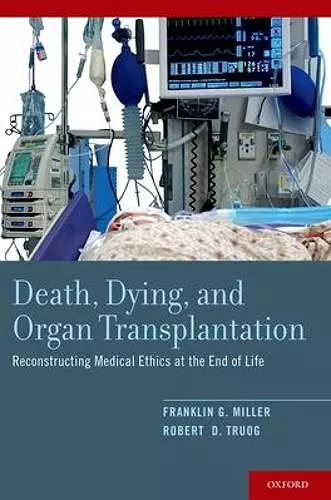Death, Dying, and Organ Transplantation
Reconstructing Medical Ethics at the End of Life
Robert D Truog author Franklin G Miller author
Format:Paperback
Publisher:Oxford University Press Inc
Published:28th Jan '16
Currently unavailable, and unfortunately no date known when it will be back
This paperback is available in another edition too:
- Hardback£88.00(9780199739172)

Miller and Truog critically examine established medical ethics, arguing that withdrawing life support and organ donation can cause death. They advocate for a reconstruction of medical ethics to align with these practices.
In Death, Dying, and Organ Transplantation, authors Miller and Truog critically examine the established principles of medical ethics concerning end-of-life care. They present a compelling argument that the act of withdrawing life support and the process of organ donation involve physicians intentionally causing the death of patients, a claim that challenges traditional ethical norms. The authors contend that patients are not truly dead when their organs are harvested for transplantation, raising significant ethical questions about the practices surrounding organ donation.
Miller and Truog delve into the misconception that ceasing life support merely allows patients to succumb to their medical conditions. They scrutinize the criteria used to declare death, particularly the concept of brain death, and argue that such determinations are often inaccurate. By exposing the factual and conceptual flaws in current practices, they aim to provide a clearer understanding of the ethical implications involved in organ procurement.
To address these complexities, the authors propose a new ethical framework that recognizes the legitimacy of organ donation from patients who are still alive at the time of organ procurement, as long as informed consent is obtained. They also explore the idea of transparent legal fictions as a pragmatic approach to navigating the ethical landscape of organ donation. Ultimately, Miller and Truog advocate for a reconstruction of medical ethics that aligns with the realities of contemporary medical practices at the end of life, ensuring that ethical considerations evolve alongside advancements in medical technology.
Although the authors draw extensively from their argumentation in published articles, this is their first full-length presentation... Their argument should be taken seriously by academic bioethicists. * DOODY'S *
This slender, 174-page book is engaging and will have broad interest to all professionals and academicians whose work touches on issues surrounding the withdrawal of lifesustaining treatment, vital organ transplantation, or both. I highly recommend Death, Dying, and Organ Transplantation: Reconstructing Medical Ethics at the End of Life and consider it one of the best bioethics texts I have read in the last year. * Andrew R. Barnosky, DO, MPH, JAMA *
The core metaphysical conclusion of the book is that "the human being dies when the body ceases to function as an organism, which is marked by the irreversible cessation of circulation and respiration" (p. 78). In support of this claim, the authors draw on a rich acquaintance with clinical practice, the relevant neuroscience, and the scientific and political history of the notion of brain death, offering a highly informed case for the view that the elimination of brain function does not destroy the ability of the rest of the organism to function in an integrated fashion. * The Hastings Center Report *
This book is amodel of quality scholarship in bioethics. The central arguments are detailed, carefully constructed, empirically well grounded, and are presented in cogent, clear prose with an economy of style, all of which are helpful to the reader in readily identifying loci of agreement and disagreement. * Benjamin E. Hippen, Metrolina Nephrology Associates, The American Journal of Bioethics *
An extensive, relevant bibliography supports the text. Summing up: Recommended. Upper-division undergraduates and above." - J.N. Muzio, emeritus, CUNY Kingsborough Community College, CHOICE
This book is very well developed in the challenges posed to the current way of thinking about clinical death and how these challenges relate to the current organ... Students and clinicians who work with patients in intensive care unit settings will benefit in many ways from the content in this book. Expanding one's mind beyond the status quo always results in meaningful knowledge and personal growth, whether one accepts the precepts or not. * Lisa Anderson, DrPH, MA, MSN, Clinical Ethics Consult Service, University of Illinois Medical Center *
Whether one agrees with Miller and Truog's viewpoints and proposals, there is no denying that this is a stimulating and thoroughly engaging book...although the book's focus is on issues at the end of life, it also carries implications for other areas over which the discourse of medical ethics casts a critical eye. For that reason, it is likely to appeal to practitioners, teachers and students of medicine and medical ethics. * Kartina A. Choong, University of Central Lancashire, Medical Law Review *
ISBN: 9780190460846
Dimensions: 231mm x 155mm x 15mm
Weight: 318g
210 pages